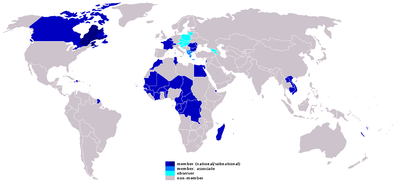Organisation internationale de la Francophonie
The neutrality of this article is disputed. |
 The Francophonie flag, symbolising the five continents, was adopted in 1987 on Niger's suggestion | |
| Official languages | French |
| Executive Secretariat | Abdou Diouf (since 2002) |
| Established | 1970. |
| Member states | 49 (plus 4 associate members and 10 observers) |
| Headquarters | Paris, France |
| Official site | Official site of La Francophonie (in French) |
La Francophonie (formally l'Organisation internationale de la Francophonie; literally "The Speakers of French"), a French language term coined in 1880 by French geographer Onésime Reclus, brother of Elisée Reclus, to designate the community of people and countries using French, is an international organisation of French-speaking countries and governments. Forty-nine states and governments are members of the organisation, four others are associate members, and ten additional states are invited observers of its Summits. Few of the member states are majority French-speaking aside from France, its overseas possessions and sub-national members. In several other member states French functions as a common language. In several others French has little current presence and the links are mainly historical and cultural.
In addition to referring to the international organisation, La Francophonie may also be used to reference the worldwide community of those people whose native language or second language is French (i.e., the French Sprachraum).
Several of the member states have a poor record when it comes to the protection of human rights and the practice of democracy. A proposed measure to impose sanctions on such countries was debated at least twice but was not approved. This is not surprising as the purpose of the organisation is not to promote international cooperation or human rights.
The modern Francophonie was created in 1970. Its motto is égalité, complémentarité, solidarité (equality, complementarity, and solidarity), harking of France's motto. Started as a small club of Northern French-speaking countries, it has since evolved into an important international organisation whose numerous branches cooperate with the organisation's member states in the fields of culture, science, economy, justice, and peace.
Structure
L'Organisation internationale de la Francophonie has an observer status at the UN General Assembly.
- 20 Mar 1970 :Agency for Cultural and Technical Co-operation (ACCT)(Agence de Coopération Culturelle et Technique).
- 4 Dec 1995 :Intergovernmental Agency of the Francophonie(Agence Intergouvernementale de la Francphonie).
- Dec 1998 :International Organization of the Francophonie (OIF) (Organisation Internationale de la Francophonie).
Executive Secretariat (Secretaries-general )
- Boutros Boutros-Ghali (Egypt) : 16 Nov 1997 - 31 Dec 2002 .
- Abdou Diouf (Senegal) : 1 Jan 2003 - current .
Summits
Summits of the Francophonie are held every two years, at which time the leaders of the member states have an opportunity to meet and develop strategies and goals for the organisation.
Past Summits:
- Paris, France (1986)
- Quebec City, Canada (1987)
- Dakar, Senegal (1989)
- Paris, France (1991)
- Mauritius (1993)
- Cotonou, Benin (1995)
- Hanoi, Vietnam (1997)
- Moncton, Canada (1999)
- Beirut, Lebanon (2002)
- Ouagadougou, Burkina Faso (2004)
The next summit will be held in 2006 in Bucharest, Romania.
Ministerial conferences
Permanent council
The Permanent Council of the Francophonie consists of Ambassadors of the member countries, and, like the ministers conferences, its main task is to plan future summits and also to supervise the implementation of summit decisions on a day-to-day basis.
Intergovernmental agency
The Intergovernmental Agency of the Francophonie is the main operator of the cultural, scientific, technical, economic and legal cooperation programs decided at the Summits. The Agency's headquarters are in Paris and it has three regional branches in Libreville, Gabon; Lomé, Togo; and Hanoi, Vietnam.
Members

The official list of members is available at the La Francophonie website. By continent:
Europe
North and South America
 Canada
Canada
 New Brunswick (participating government)
New Brunswick (participating government) Quebec (participating government)
Quebec (participating government) Ontario (observer, but may join in the future)
Ontario (observer, but may join in the future)
 Dominica
Dominica Haiti
Haiti Saint Lucia
Saint Lucia- French dependencies:
Africa
 Benin
Benin Burkina Faso
Burkina Faso Burundi
Burundi Cameroon
Cameroon Cape Verde
Cape Verde Central African Republic
Central African Republic Chad
Chad Comoros
Comoros Republic of the Congo
Republic of the Congo Ivory Coast
Ivory Coast Democratic Republic of the Congo
Democratic Republic of the Congo Djibouti
Djibouti Egypt
Egypt Equatorial Guinea
Equatorial Guinea Gabon
Gabon Guinea
Guinea Guinea-Bissau
Guinea-Bissau Madagascar
Madagascar Mali
Mali Mauritania
Mauritania Mauritius
Mauritius Morocco
Morocco Niger
Niger Rwanda
Rwanda São Tomé and Príncipe
São Tomé and Príncipe Senegal
Senegal Seychelles
Seychelles Togo
Togo Tunisia
Tunisia
Asia
 Cambodia
Cambodia Laos
Laos-
Oceania
Associate members
Additional states
See also
- Francophone
- French colonial empire
- Agence de coopération culturelle et technique
- Minister responsible for La Francophonie (Canada)
- Jeux de la Francophonie
- Community of Portuguese Language Countries
- the Latin Union
- Commonwealth of Nations
- French in the United States
- Franco-Canadian relations
External links
